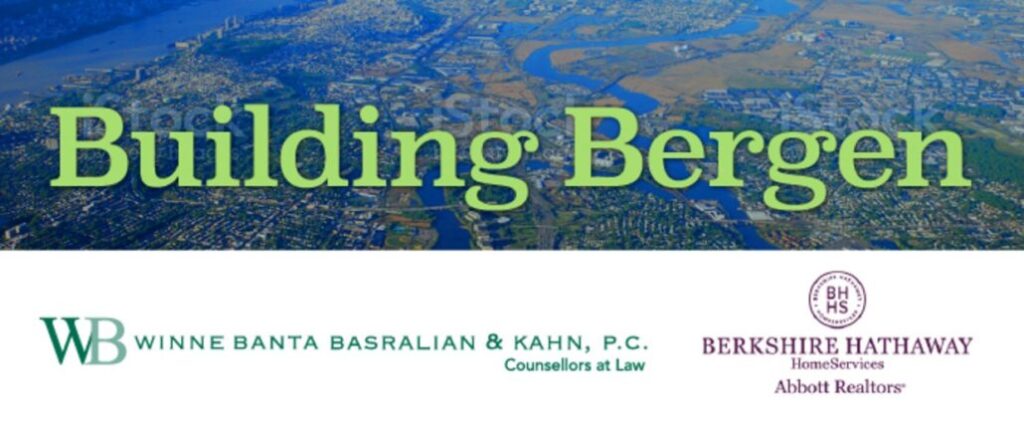
An Interview with Michael McPartland, Mayor of Edgewater
Michael J. McPartland, lifelong resident of Edgewater and Mayor of the Borough since 2015, has a very optimistic outlook for his community.
In the summer of 2021, he feels very fortunate that no one in Edgewater’s senior centers tested positive for COVID. To ensure the seniors’ continued good health, the borough teamed up with nearby Hackensack Meridian Palisades Medical Center to provide vaccinations for the entire senior population. Buses picked them up and nurses provided jabs right on the bus. Nearly 1,000 Pfizer vaccines were dispensed in short order. In an effort coordinated by Borough Hall, once the seniors were covered, others in Edgewater were invited to get their vaccines as well. Says McPartland, “We are very proud of this initiative. Honestly, I wasn’t sure this was going to work.”
Edgewater businesses, too, weathered the COVID storm. Many took advantage of the Bergen County CARES Small Business Grant Program, an economic stability measure designed to provide financial relief to small businesses negatively affected by the COVID-19 pandemic and to increase overall business confidence during the recovery. Over $50 million was dispensed to businesses throughout the County.
After a COVID-limited summer in 2020, Mayor McPartland describes the summer of ’21 as “a new birth, a new beginning.” He adds, “It’s like we didn’t miss a beat.” The Borough’s recreation center is fully operational and recently hosted its annual summer picnic – a luau – for over 100 seniors. The summer youth recreational program also is operating at full force, and the summer concert series at Veterans Field is back in business.
There is always development happening in Edgewater, and 2021 is no exception. Of note currently is the Hess Oil Terminal property on River Road, amounting to nearly 19 acres. The developer, 615 River Road Partners, LLC, proposed replacing the terminal with 1,874 new units, which was determined to be far too large for the community. In what McPartland describes as “one of the best land acquisitions by a municipality in the history of Bergen County,” Edgewater succeeded in reducing the number of units by half and transferring the entire western portion of the property, valued at $12 million, to the community to build a future middle school, while also settling the community’s Affordable Housing obligation with the State of New Jersey, resulting in 180-240 new affordable units. According to Mayor McPartland, “We are receiving a property that would otherwise cost millions to purchase, for free, as well as solving state-mandated, affordable housing requirements, bringing our community a public riverfront park and walkway, and gaining much-needed transportation improvements in Edgewater, with a new ferry stop and added green space.”
At the same time, a former golf driving range is being developed into a 230-unit high-rise project, and a Superfund site remediation is nearing completion.

Northern New Jersey Commercial Real Estate Market
By Joseph L. Basralian, Esq.
The commercial real estate market in Northern New Jersey is alive and well. There had been an immediate downturn after the New Jersey lockdown, not so much because clients didn’t want to buy or sell or refinance, but rather because there was little or no access to sellers, buyers, brokers, or lenders by virtue of the lockdown itself. By May of 2020 that began to change, and the pent-up backlog of commercial real estate transactions started moving forward at a pace equal to or greater than 2019.
The construction of multiple family residential buildings in Northern New Jersey continued almost unabated during COVID. Thousands of residential rental units are being constructed throughout the region with more new projects — large and small — announced nearly every week. Even where construction was deemed nonessential, it continued on a number of buildings that had to be enclosed to prevent deterioration of what had already been constructed prior to the pandemic. Most of the multiple family housing market is based upon a very active market demand, although some is driven by the need of municipalities to meet their third-round affordable housing allocations. Except perhaps on the New Jersey Gold Coast, new, large, multiple-family construction is based on a demand for new rentals with excellent amenities near mass transportation, rather than for sale as condominium units. Moreover, construction and permanent loan rates are stable, and are at the lower end of rates over the last several years.
Prices continue to rise for commercial buildings, especially in the warehouse/distribution sector. Even the strip shopping centers retail market seems to have stabilized, albeit at lower occupancy rates than in 2019. The biggest problem facing owners is that many tenants have exploited the inability of their landlords to bring suits for possession for those tenants who have elected not to pay rent even when they have the ability to do so. The only unaffected sector is the office market. However, it is unaffected because the general vacancy has been over twenty percent for at least five years. That same sector has seen very little new construction other than for owner occupied buildings that are generally small in nature. In order to bring down vacancy rates, many owners are repositioning their office buildings for laboratory/testing and research as well as for more traditional medical uses such as doctors’ offices and surgical and imaging centers. The medical sector represents approximately twenty to thirty percent of new tenants in office buildings in Northern New Jersey. The percentage of such uses is even higher in other parts of the country.
The Bergen County real estate market continues to be in demand and, barring the unforeseen, looks to remain strong for the next several years.
Northern New Jersey, and especially Bergen County, has seen construction in the commercial markets remain steady with the demand for warehouse buildings high and escalating per square foot rents. New Jersey Senate Bill (S-3688) seeks to curb what it terms “warehouse sprawl” by requiring municipalities to seek input from neighboring towns before approving a new warehouse project. The Bill’s sponsors posture that “warehouse sprawl has become a real threat to the quality of life in communities throughout the State and the rapid surge in construction of larger sized warehouses has a regional impact that crosses municipal boundaries to neighboring towns” and that they should have a voice in the approval process. It is sometimes difficult and time-consuming to obtain approval from a municipality without obtaining approval from neighboring municipalities, which will only further slow the approval process. Instead of fostering a strong warehouse/distribution market, especially along the interstates, more and more municipalities are adopting ordinances prohibiting the construction of warehouse/distribution buildings altogether because of concern that the existing infrastructure is inadequate and the impact on local traffic, thereby making all the previously approved warehouses non-conforming uses. It is perhaps shortsighted for municipalities to do so. The current warehouse/distribution industry pays millions and millions of dollars of annual taxes to those municipalities and their school budgets without sending children to their schools or placing a high demand on their municipal services. The pandemic has shown the need for larger warehouse/distribution facilities and those types of facilities could be driven to other states where no restrictions exist. How the proposed Senate Bill, if adopted, will impact the warehouse/distribution industry, both in Northern New Jersey and the state as a whole, remains to be seen.

Northern New Jersey Residential Real Estate Market
By Robert Abbott
Everyone is talking about it. The real estate market is hot. But will it last? What will the future bring over the next six months – or six years?
Developers and builders are trying to predict the future. The statistical information shows that more properties are selling than last year. According to the New Jersey MLS system, 3,858 single-family homes sold in Bergen County in the first half of 2021. During the same time period last year, 2,760 homes sold. This reflects a 40% increase. Houses are selling faster, at only 46 days on the market, and at approximately 1.6% off the asking price. This all adds up to a lack of inventory.
Builders are looking to bridge the gap by creating new products for the marketplace. The consumer is looking for affordable new construction. With Bergen County’s lack of vacant land, builders are turning to rezone other types of properties for residential use. Golf courses, farms, industrial sites, and office complexes are all in play to be redeveloped. Smart town leaders understand the value of new development in their communities, creating product that taxpayers want, creating tax rateables, reaching their affordable housing requirement, and enhancing the value of all town properties.
Even though people typically are averse to changes in their community, once projects are complete, they are usually very satisfied with the results. Forward-thinking, progressive community leaders can advance their towns in so many ways. Developers want to work in the communities that show a spirit of cooperation and sensible development. They will, however, shy away from towns in which it will take three years just to get approvals. Currently, developers are looking for shovel-ready projects and will pay a premium for them. They are trying to fill an immediate need.
Banks are loosening up financing restrictions on this type of development. Now, more than ever before, they are looking to finance for-sale products. Although the market in the higher range is still sluggish, there is a substantial need for properties under a million dollars. People want new designs, modern kitchens and stylish amenities, and are less interested in large square footage and acreage. Smaller single-family homes, condos and townhouses are the major need in the Bergen County market.
Robert Abbott is Broker/Owner with Berkshire Hathaway HomeServices Abbott Realtors. He can be reached at bhhsabbott@gmail.com or (201) 891-2223.
If you have questions concerning BUILDING BERGEN, or have ideas for what you would like to see in future newsletters, contact Alan Levine at alevine@levinemarketingsolutions.com.

